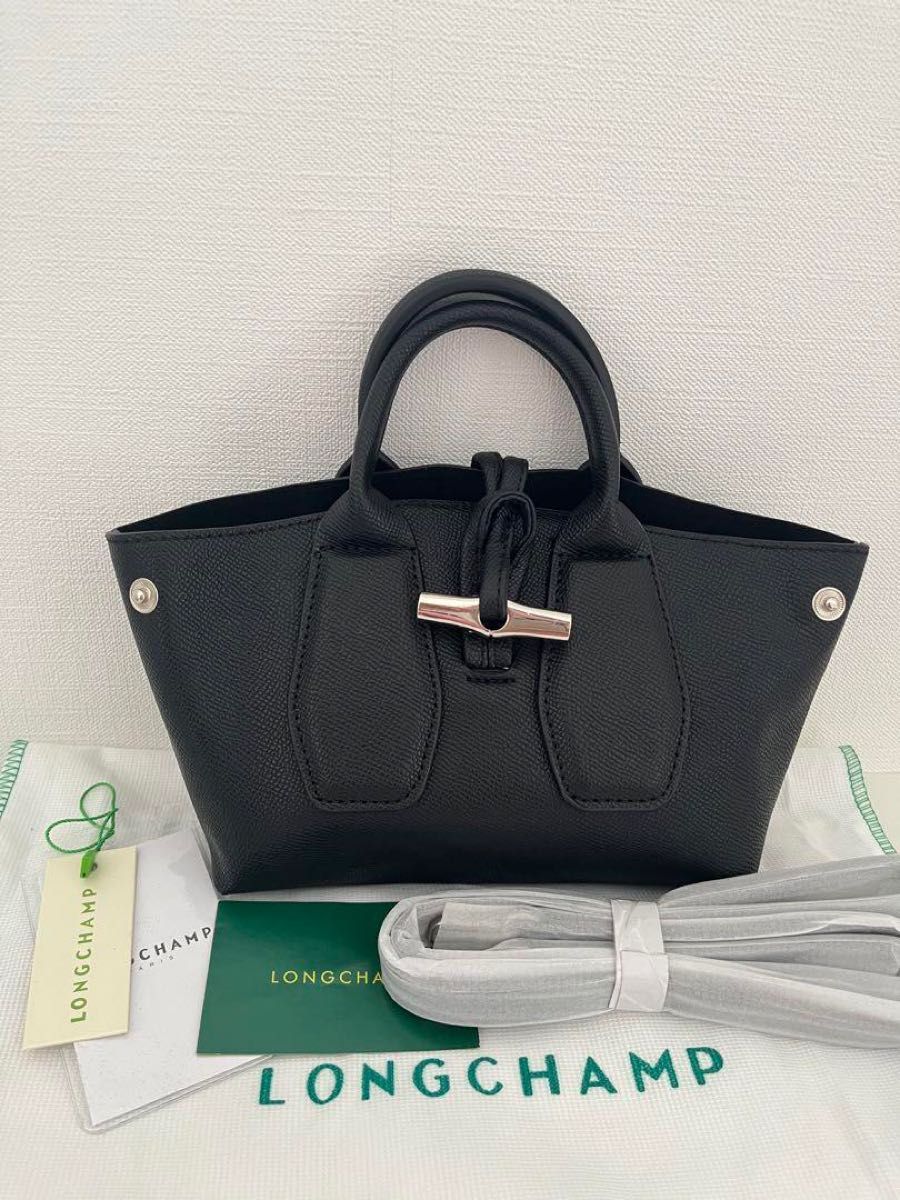極美品✨LONGCHAMP ロンシャン ロゾ トップハンドルバッグ S
(税込) 送料込み
商品の説明
ご覧いただき、誠にありがとうございます。
こちらの商品は【即購入OK】の商品となっております。
ご希望の方はコメント不要でそのままご購入ください。
●商品名
LONGCHANP ロンシャン ROSEAU ロゾ ハンドバッグ トップハンドルバッグ S レザー ショルダーストラップ付き ライトブルー
●ブランド:LONGCHANP(ロンシャン)
●商品の状態:A(未使用に近い)
S:新品、未使用
A:未使用に近い
B:目立った傷や汚れなし
C:やや傷や汚れあり
D:傷や汚れあり
●状態についての補足
ほとんど使用感のない美品となります。
●サイズ:実寸サイズ(平置き)
・幅:22cm
・高さ:16cm
・マチ:11cm
・持ち手:28cm
●色:ライトブルー
●購入先:大手リサイクルショップにて購入
◆配送について
17時までのご注文の場合は即日手配。それ以降のご注文の場合は翌日手配とさせていただきます。配送日や配送時間のご指定がある場合は、事前にお伝えくださいますようお願い申し上げます。
◆その他注意事項
・商品の検品は十分に行っておりますが、見落とし等がある場合もございます。また、商品は自宅保管となりますのでご理解ください。
・送料の都合上、商品は小さくたたんで発送いたします。
・ご覧いただいている商品のカラーにつきましては、光の加減等により多少異なる場合がございます。
管理番号:08912-905032商品の情報
| カテゴリー | レディース > バッグ > ハンドバッグ |
|---|---|
| ブランド | ロンシャン |
| 商品の状態 | 未使用に近い |

極美品✨LONGCHAMP ロンシャン ロゾ トップハンドルバッグ S-

ロンシャン ロゾ トップハンドルバッグネイビー - ハンドバッグ

極美品✨LONGCHAMP ロンシャン ロゾ トップハンドルバッグ S-

ロンシャン ロゾ トップハンドルバッグネイビー - ハンドバッグ

在庫有 S- ✨極美品✨ ロンシャン ロンシャン 極美品✨LONGCHAMP ロゾ

縦中央18cm両端25cmロンシャン ロゾ - ハンドバッグ

2024年最新】ロンシャン longchamp ロゾ roseau ショルダーバッグ l 79

✨極美品✨LONGCHAMP ロンシャン ロゾ ハンドバッグ ビジネスバッグ-

極美品✨LONGCHAMP ロンシャン ロゾ トップハンドルバッグ S-

ロンシャン ミニボストンバッグ レザー シボ皮 黒 袋付

LONGCHAMP - 【極美品】ロンシャン ロゾ トップハンドルバッグM

ロゾ S トップハンドルバッグ コニャック - レザー | ロンシャン JP

ロンシャン ロゾ トップハンドルバッグネイビー - ハンドバッグ

トライアスロン ほぼ未使用【LONGCHAMP ロンシャン】ロゾ トップ

アウトレット公式店 LONGCHAMPロゾトップハンドルバッグ - バッグ

極美品】希少 ロンシャン LONGCHAMP プリアージュ キャンバス レザー-

レア商品 ロンシャン ロゾ トップハンドルバッグ 2WAY ブラウン×ブラック-

最低価格の Longchamp ロンシャン ロンシャン ロゾ ロゾ トップ

超安い LONGCHAMPロンシャン ロゾ クロコ型押し ブラック A4可 A4可

ロゾSトップハンドルバック-

極美品 LONGCHAMP ロンシャン ロゾ レザートートバッグ ネイビー-

ロンシャン ロゾ(ブラウン/茶色系)の通販 50点 | LONGCHAMPを買う

選ぶなら 【新品同様】 ロンシャン ロゾ S ハンドバッグ ショルダー

ロンシャン ミニボストンバッグ レザー シボ皮 黒 袋付

ロンシャンのロゾシリーズsです.2022年の1月に購入、保管していました。-

レア商品 ロンシャン ロゾ トップハンドルバッグ 2WAY ブラウン×ブラック-

生産停止 ロンシャン ロゾ トップハンドルバッグM-グレー - バッグ

美品☆LONGCHAMP ロンシャン ロゾ 型押しレザー トートバッグ 保存袋付

ロンシャン ROSEAU レザー トートバッグ ピンクレッド-

ランキング上位のプレゼント ロンシャン ロゾ M トップハンドルバッグ

決算特価送料無料 LONGCHAMP 本革 38点 【極美品】LONGCHAMPロンシャン

おしゃれ 【LONGCHAMP】ロゾ ハンドバッグ ロンシャン ロゾ バッグ

ロンシャン ミニボストンバッグ レザー シボ皮 黒 袋付

美品✨Longchamp ロンシャンハンドバッグトートバッグ ブラック黒 羽-

ロゾ S トップハンドルバッグ ブラック - レザー | ロンシャン JP

2024年最新】ロンシャン ロゾ トップハンドルの人気アイテム - メルカリ

ロンシャン 限定バッグ 美品-

ロンシャンのロゾシリーズです.2022年の1月に購入、保管していました。-

2023 新作 【新品】Longchamp ハンドバッグ Roseau S トップハンドル

美品 LONGCHAMP ロンシャン ロゾ-









商品の情報
メルカリ安心への取り組み
お金は事務局に支払われ、評価後に振り込まれます
出品者
スピード発送
この出品者は平均24時間以内に発送しています














